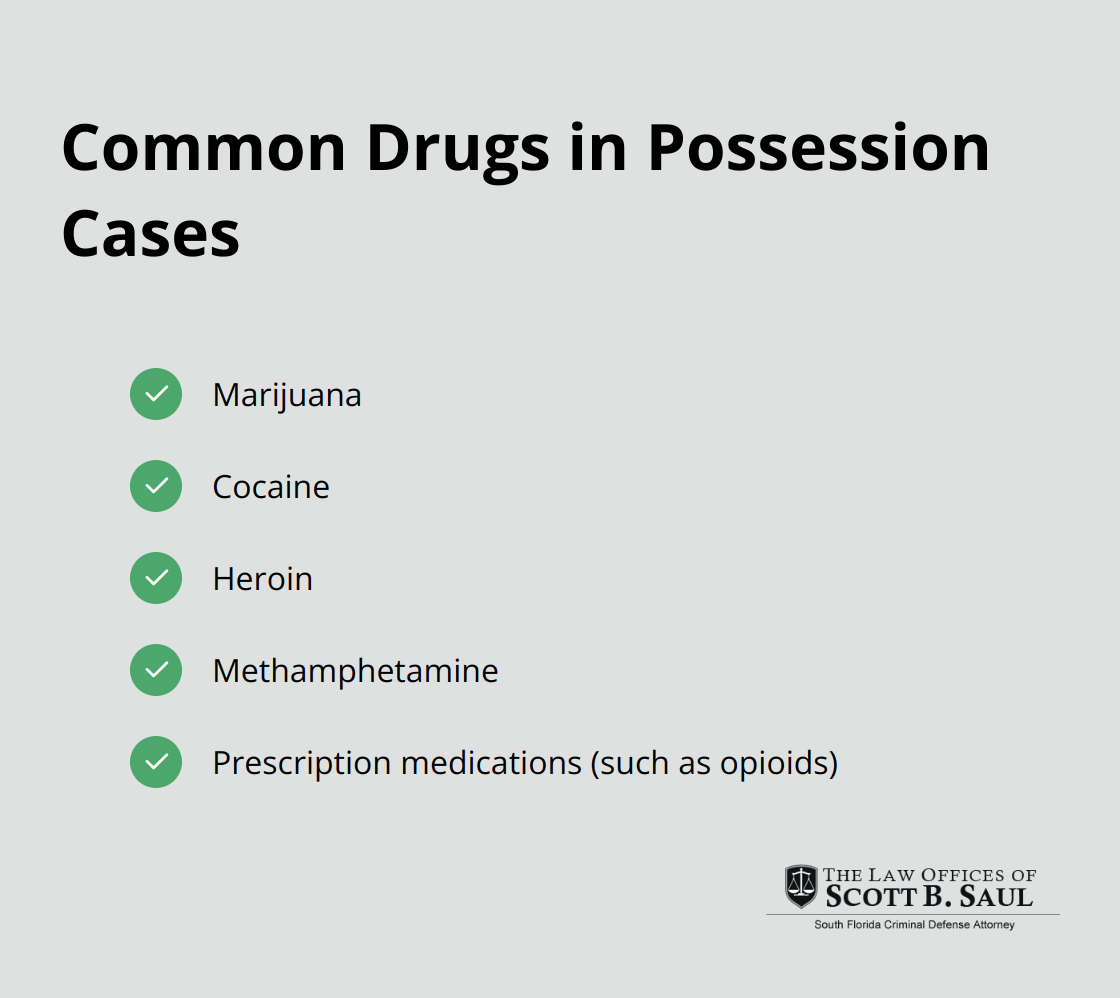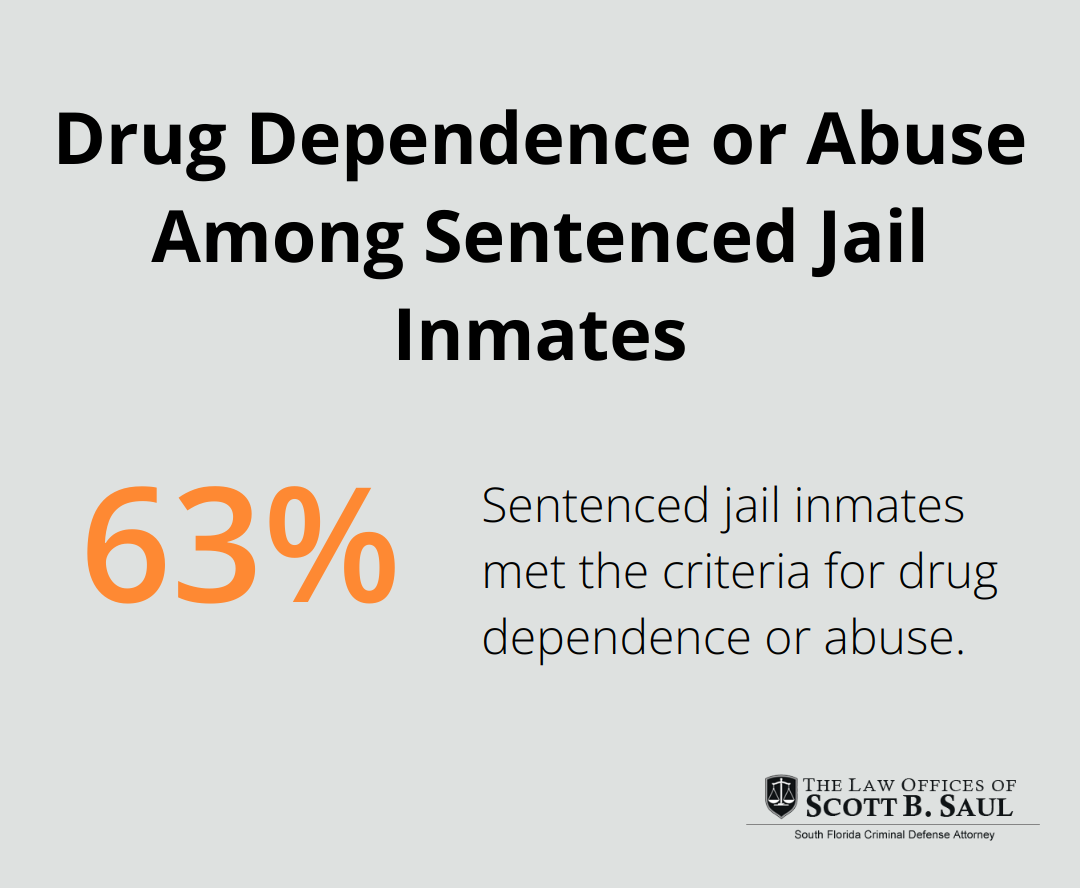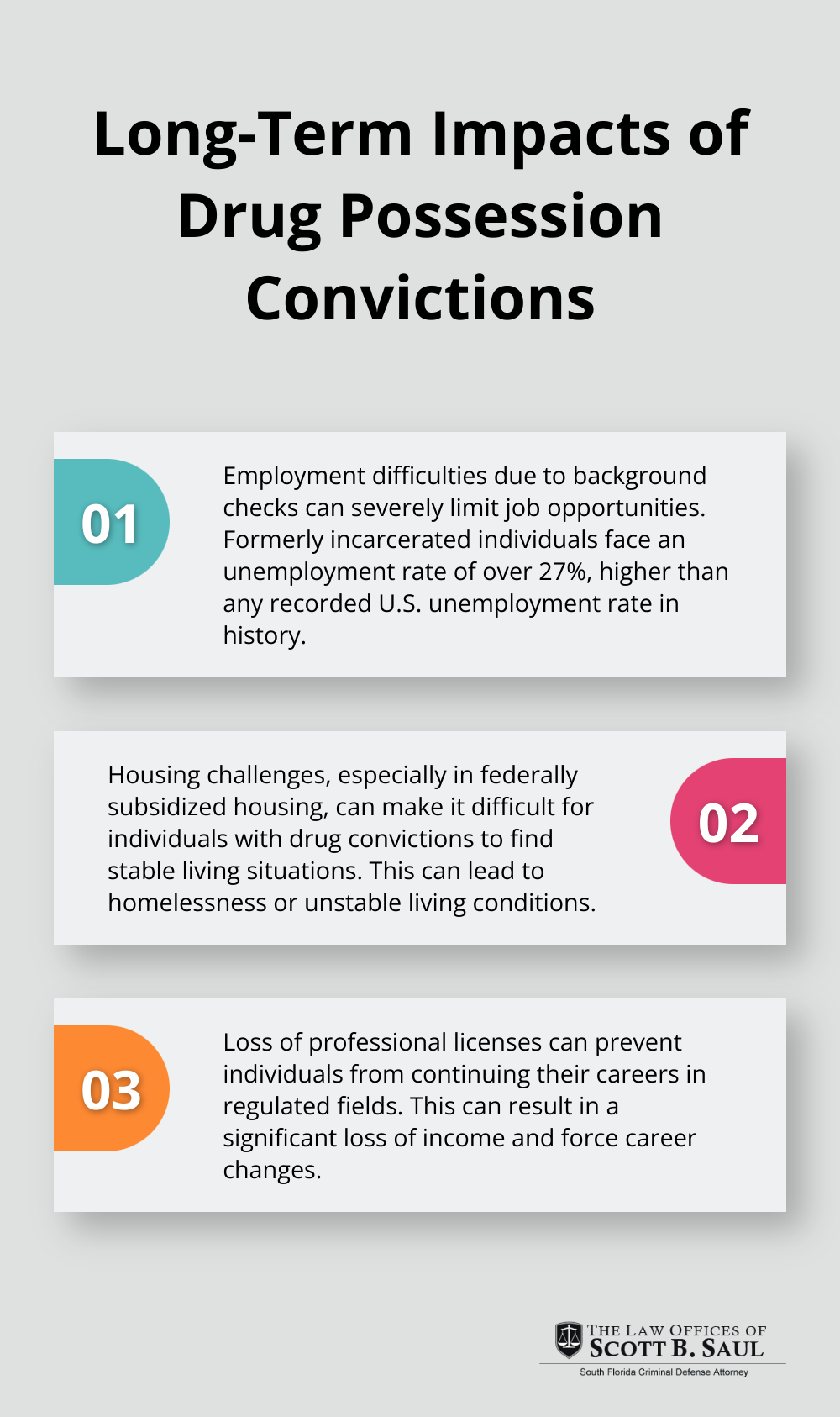Is Drug Possession a Felony or Misdemeanor?
By : saulcrim | Category : Criminal Defense | Comments Off on Is Drug Possession a Felony or Misdemeanor?
12th Jun 2025

Drug possession charges can have serious consequences, but the classification as a felony or misdemeanor depends on various factors.
At Law Offices of Scott B. Saul, we understand the complexities surrounding drug possession cases and their potential impact on your life.
This post will explore the key elements that determine whether drug possession is treated as a felony or misdemeanor, helping you navigate the legal landscape more effectively.
What Is Drug Possession?
Definition and Types of Possession
Drug possession refers to having control over an illegal substance. This control can be physical (e.g., carrying drugs in your pocket) or constructive (e.g., drugs found in a location you have access to, like your car or home). The law recognizes two main types of possession: simple possession and possession with intent to distribute.
Simple Possession vs. Intent to Distribute
Simple possession of illegal drugs is a criminal offense under federal law and in many state jurisdictions. In contrast, drug distribution indicates intent to sell or transfer those substances. This distinction significantly impacts the severity of charges and potential penalties.
Common Drugs in Possession Cases
Drug possession cases involve a wide range of substances. Despite changing laws in many states, marijuana remains one of the most common drugs in these cases. Other frequently encountered substances include:

The type of drug involved plays a significant role in determining the severity of charges.
Impact of Drug Quantity
The amount of drugs found is a critical factor in possession cases. Larger quantities often lead to more severe charges, potentially escalating from misdemeanors to felonies. For example, possessing a small amount of marijuana might result in a misdemeanor charge in some jurisdictions, while having several ounces could lead to felony charges.
The specifics of each case (including the type and quantity of drugs) can dramatically affect the outcome. Experienced defense attorneys (like those at Law Offices of Scott B. Saul) often use their knowledge of how these cases are built and prosecuted to develop strong defense strategies for their clients.
As we move forward, we’ll examine the factors that determine whether drug possession is classified as a felony or misdemeanor, which can significantly impact the legal consequences for the accused.
What Determines Drug Possession Classification?
Drug Type and Quantity
The classification of drug possession as a felony or misdemeanor depends on several key factors. The type and quantity of the drug play a significant role. For example, possession of a small amount of marijuana might result in a misdemeanor in some states, while the same amount of heroin could lead to felony charges.
Quantity thresholds vary by state and drug type. In Florida, possession of more than 20 grams of marijuana is classified as a felony, while any amount of cocaine exceeding 28 grams leads to felony charges. These thresholds underscore the importance of understanding local laws when facing drug possession charges.
Prior Criminal History
An individual’s criminal record significantly influences how drug possession charges are classified. First-time offenders often face less severe penalties compared to repeat offenders. According to the Bureau of Justice Statistics, about two-thirds (63%) of sentenced jail inmates met the criteria for drug dependence or abuse, based on data collected in 2007 and 2008-09.

Some jurisdictions have implemented “three strikes” laws, where a third drug offense automatically results in felony charges, regardless of the drug type or amount. This approach aims to deter repeat offenses but can lead to severe consequences for individuals struggling with addiction.
State-Specific Laws
Drug laws vary significantly from state to state. While some states have decriminalized certain drugs or implemented more lenient penalties, others maintain strict policies. For instance, California’s Proposition 47, passed in 2014, reclassified many drug offenses from felonies to misdemeanors, leading to a 30% decrease in the state’s prison and jail populations.
Federal vs. State Jurisdiction
The jurisdiction under which a case falls can significantly impact its classification and potential penalties. Federal drug charges typically carry harsher sentences than state charges. According to the U.S. Sentencing Commission, approximately 46% of federal prisoners are incarcerated for drug-related offenses, compared to only 14% of state prisoners.
Federal charges often come into play when drug trafficking across state lines is involved or when the offense occurs on federal property. Understanding whether a case falls under state or federal jurisdiction is essential for developing an effective defense strategy.
The classification of drug possession charges involves complex factors that require careful consideration. The next section will explore the legal consequences of drug possession, including potential penalties for both misdemeanor and felony charges.
What Are the Legal Consequences of Drug Possession?
Misdemeanor Possession Penalties
Drug possession charges classified as misdemeanors typically result in less severe punishments. Most states impose penalties of up to one year in county jail and fines between $500 and $1,000. Courts may also order probation, mandatory drug education programs, and community service.
In Florida, possession of 20 grams or less of cannabis is a misdemeanor punishable by a maximum sentence of 1 year imprisonment and a maximum fine of $1,000. Even misdemeanor convictions may trigger a driver’s license suspension for at least six months.
Felony Possession Penalties
Felony drug possession charges carry harsher penalties. Convictions may result in:
- Prison sentences from one year to life
- Fines up to $250,000 (or more)
- Mandatory minimum sentences for specific drug types and quantities
- Extended probation periods
- Asset forfeiture
The U.S. Sentencing Commission reports that in 2021, of the 57,287 National cases, 17,692 offenders were sentenced under USSG Chapter Two, Part D (Drugs). This duration varies based on factors such as drug type, quantity, and criminal history.
Long-Term Impacts
Drug possession convictions have far-reaching consequences beyond immediate legal penalties. Individuals often face:

A Prison Policy Initiative study found that formerly incarcerated people experience unemployment at a rate of over 27% – higher than any U.S. unemployment rate in recorded history (including the Great Depression).
Alternative Sentencing Options
Many jurisdictions now offer alternative sentencing for drug possession cases, particularly for first-time offenders or those struggling with addiction. These programs address underlying substance abuse issues rather than focus solely on punishment.
Common alternatives include:
- Drug courts: Specialized programs combining judicial supervision with treatment
- Diversion programs: Offenders complete treatment and other requirements in exchange for dismissed charges
- Probation with mandatory treatment: Combines supervision with required rehabilitation
- Community service: Often paired with other rehabilitative measures
The National Institute of Justice reports that drug courts reduce recidivism rates by 8% to 14% compared to traditional criminal justice processing.
Legal Representation
When facing drug possession charges (whether misdemeanor or felony), seeking experienced legal representation is essential. A skilled attorney can navigate the complexities of drug laws, explore alternative sentencing options, and work to minimize the long-term impacts of a conviction.
Final Thoughts
Drug possession charges can be classified as either a felony or misdemeanor, depending on various factors. The type and quantity of the drug, prior criminal history, and specific state laws all influence the severity of the charge. Federal cases often carry harsher penalties compared to state-level offenses, and the consequences of a conviction extend far beyond immediate legal penalties.
Given the complexity of drug laws and the potential long-term impacts, seeking experienced legal representation is essential when facing drug possession felony or misdemeanor charges. An attorney with expertise in this area can navigate the intricacies of the legal system, explore alternative sentencing options, and work to minimize the consequences of a conviction. At Law Offices of Scott B. Saul, we bring over 30 years of experience in criminal defense to every case, specializing in defending tourists and foreign travelers facing criminal charges in South Florida.
Our firm offers personalized attention and aggressive representation to protect our clients’ rights. Scott B. Saul’s background as a former federal and state prosecutor provides valuable insights for developing effective defense strategies. Don’t let a drug possession charge derail your future – contact the Law Offices of Scott B. Saul for expert legal guidance and representation.
Archives
- June 2025 (4)
- May 2025 (9)
- April 2025 (8)
- March 2025 (9)
- February 2025 (8)
- January 2025 (9)
- December 2024 (10)
- November 2024 (5)
- July 2024 (2)
- June 2024 (2)
- May 2024 (2)
- April 2024 (2)
- March 2024 (2)
- February 2024 (2)
- January 2024 (2)
- December 2023 (2)
- November 2023 (2)
- October 2023 (2)
- September 2023 (2)
- August 2023 (1)
- July 2023 (2)
- June 2023 (2)
- May 2023 (2)
- April 2023 (2)
- March 2023 (2)
- February 2023 (2)
- January 2023 (2)
- December 2022 (2)
- November 2022 (2)
- October 2022 (2)
- September 2022 (2)
- August 2022 (2)
- July 2022 (2)
- June 2022 (2)
- May 2022 (2)
- April 2022 (2)
- March 2022 (2)
- February 2022 (2)
- January 2022 (2)
- December 2021 (2)
- November 2021 (2)
- October 2021 (2)
- September 2021 (2)
- August 2021 (2)
- July 2021 (2)
- June 2021 (2)
- May 2021 (2)
- April 2021 (2)
- September 2020 (5)
- July 2020 (4)
- June 2020 (4)
- May 2020 (4)
- April 2020 (5)
- March 2020 (4)
- February 2020 (4)
- January 2020 (4)
- December 2019 (1)
- November 2019 (4)
- October 2019 (4)
- September 2019 (4)
- August 2019 (4)
- July 2019 (5)
- June 2019 (4)
- May 2019 (4)
- April 2019 (4)
- March 2019 (4)
- February 2019 (4)
- January 2019 (4)
- December 2018 (4)
- November 2018 (5)
- October 2018 (5)
- September 2018 (4)
- August 2018 (4)
- July 2018 (7)
- June 2018 (4)
- May 2018 (4)
- April 2018 (8)
- March 2018 (4)
- February 2018 (4)
- January 2018 (4)
- November 2017 (4)
- October 2017 (4)
- September 2017 (4)
- August 2017 (7)
- July 2017 (6)
- June 2017 (4)
- May 2017 (4)
- April 2017 (4)
- March 2017 (4)
- February 2017 (7)
- January 2017 (4)
- December 2016 (7)
- November 2016 (4)
- October 2016 (4)
- September 2016 (10)
- August 2016 (4)
- July 2016 (4)
- June 2016 (4)
- May 2016 (4)
- April 2016 (4)
- March 2016 (4)
- February 2016 (7)
- January 2016 (4)
- December 2015 (5)
- November 2015 (4)
- October 2015 (7)
- September 2015 (4)
- August 2015 (4)
- July 2015 (13)
- June 2015 (9)
- May 2015 (8)
- April 2015 (6)
- March 2015 (4)
- February 2015 (4)
- January 2015 (4)
- December 2014 (4)
- November 2014 (4)
- October 2014 (4)
- September 2014 (3)
Categories
- Adjudication (1)
- Bankruptcy (1)
- Burglary Crimes (3)
- calendar call (1)
- Car Accident (1)
- Criminal Defense (326)
- Cyber Crimes (7)
- DNA (1)
- Domestic Violence (9)
- Drug Crimes (5)
- DUI (12)
- Embezzlement (1)
- Environmental Crimes (4)
- Expungement Law (2)
- Federal Sentencing Law (3)
- Firearm (3)
- Forgery (4)
- General (82)
- Healthcare (3)
- Immigration (1)
- Indentity Theft (1)
- Insurance (5)
- judicial sounding (2)
- Juvenile Crimes (4)
- Manslaughter (4)
- Money Laundering (3)
- Organized Crime (1)
- Racketeering (1)
- Reckless Driving (3)
- RICO (3)
- Sealing and Expunging (2)
- Sex Offense (1)
- Shoplifting (1)
- Suspended Driver's License (1)
- Traffic (4)
- Trending Topics (1)
- White-collar Offenses (1)

